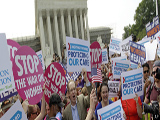Small Business Owners Divided Over Health Care Ruling
Post Views 2
A majority of them expressed surprise at the entirety of the acceptance and said that they had expected parts of the law to be struck down. However, they were unsure whether it was a harbinger of good or bad news for them.
Rose Corona, owner of Big Horse Feed and Mercantile, a retail feed and old-fashioned general store in Temecula, California said, “I know I’m going to have to reduce the size of [my] labor force and amount of business I can do because of this and it’s not just me — it’s across the board. Practically, this means we will have to start cutting jobs.”
However, Mike Roach, co-owner with wife Kim Osgood of Paloma Clothing, a women’s clothing store in Portland Ore., does not share Corona’s anxiety and said that he was “thrilled” over the Supreme Court’s decision.
He stood to benefit from the increase in small business health care tax credit, for businesses with less than 25 employees, that stood to grow from the existing 35 percent to 50 percent in 2014. He said, “That means the over $7,000 in income tax credits I get will remain intact and continue to help us buy health insurance,” Roach said. “I’m relieved that wasn’t taken away.”
Roach also feels that the creation of state-based exchanges, that has been made mandatory by the new provisions, will provide affordable coverage for individuals and be a boon to small businesses.
He said that exchanges will help pool purchasing power and help them get better rates from the companies, alleging that currently they were being fleeced by unscrupulous insurance companies.
However, other business owners expressed concerns that the law’s compulsion that employers would have to purchase insurance for its employees, may make employers less inclined to employ more, thereby adding to the unemployment.
The new law mandates that businesses with 50 or more full-time equivalent employees that do not provide health insurance coverage expose themselves to a penalty of $2,000 per full-time employee in excess of 30 full-time employees.
Dan Galbraith, owner of Solutionist, a visual communication, sales and marketing firm in Greensburg, Pa. expressed his fear that this provision would make employers stay within the 50-employee perimeter. “Those who employ 60 are going to lay off 11. Those who employ 49 will hire nobody,” he said.
He confessed that one of his colleagues, who currently has a business that employs 70 people, plans to close down and start a business that does not require employees. He says that he will start a business that does not have health care built into its business model.
Corona was in consonance with Galbraith and agreed that “the biggest expense for a small business owner is labor force and investment in people.”
She feared that in these tough economic times, when business were employing austerity measures to stay alive, this new added expense would force them to close down. She says, that considering that in many circumstances, the penalty would be less than the coverage, people would prefer to pay the penalty and leave their workers to the government to provide health coverage.
Moreover, the legal problems and the objections that the new provisions have brought in their wake have made compliance very uncertain and tentative. She said that there are going to be many attempts on the part of affected parties, especially small businesses, to get this law repealed. “I’m not saying there shouldn’t be affordable health care for everybody, but if you bite off more than you can chew, you will choke yourself. With this legislation, small business is just seeing costs going up and we’re finding it difficult to swallow.”
Roach however, believes that the continued debates and discussions will help resolve the myriad health-coverage problems that the small businesses are plagued with.
“Small businesses are struggling and have been completely overlooked, and this is the first piece of legislation that has singled out mom-and-pop businesses with 10 or fewer employees to receive the maximum benefit,” he said. “I hope that can be brought to light and made more clear to the American public in the next year or two.”
Small Business Owners Divided Over Health Care Ruling by Harrison Barnes


 10 Jobs with the Fastest Growing Salary in 2017
10 Jobs with the Fastest Growing Salary in 2017  The Economy Under a Trump Presidency
The Economy Under a Trump Presidency  San Diego County Back to Full Employment
San Diego County Back to Full Employment  Top Five Reasons Talented Employees Quit
Top Five Reasons Talented Employees Quit